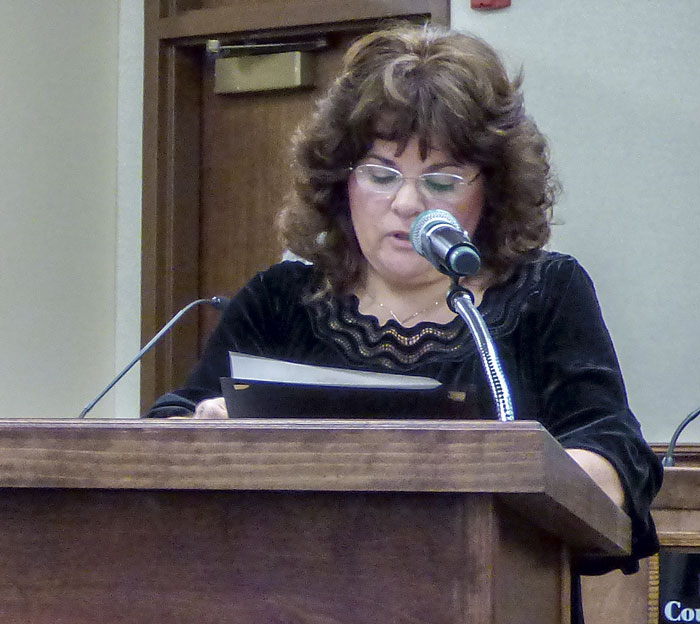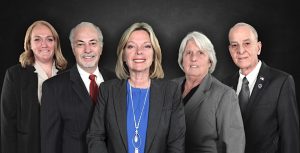Fleisch brags on rebuilding Lake Peachtree dam, upgrading Public Works, taking over sewer authority; “City in better shape today than in decades” —
Peachtree City Mayor Vanessa Fleisch at the Jan. 17 council meeting presented the 2019 State of the City address. Her comments offered a review of 2018 and a look ahead to 2019 and the near-term future.
For many in the city, one of the main sticking points is traffic, especially the intersection of Ga. highways 54 and 74. Along each highway, traffic volumes per day are estimated in the area of 36,000 vehicles.
“In 2014, we did an analysis of the Hwy. 54 West corridor, which is a state-owned and operated road, to see what, if anything could be done to make the traffic in that area flow better,” said Fleisch. “We shared the results of the study with the Ga. Department of Transportation (DOT) and we worked very well with them to help complete two major projects — the intersections of Hwy. 54 and MacDuff Parkway and Hwy. 54 and Planterra Way.”
Addressing the ultimate goal of finding a solution for the Hwy. 54/74 intersection, Fleisch said, “DOT has been working on the new displaced left turn for 54 and 74 and we will hear more about this in a few months. DOT really went to bat for us and secured $10 million in federal funding for this project.”
Commenting on the status of the planned interchange upgrade at Hwy. 74 and Interstate 85, Fleisch said the large project continues to move forward.
Fleisch said the Great Recession taught city leaders that initiatives pertaining to redevelopment, increased density and annexation should be adopted.
“The city is 60 years old this year and redevelopment and incentives for redevelopment need to be topics of discussion,” she said. “To that end, we are in the process of looking at the area around City Hall as a potential spot to redevelop so that we can make the highest and best use of this corridor. Redeveloping this area was a part of the conversation when we did the most recent comprehensive plan with our citizen volunteers.”
The next step is to apply for planning and implementation grants, said Fleisch, adding her hope that the city will win the grant to help move this process along so that ways can be found to revitalize the area and spur private investment in the city.
“If the redeveloped areas have a higher density, that could help to maintain the tax base for the city. The goal is to add to the tax base. This will enable the city to not have continual increases in our citizens’ taxes,” Fleisch noted. “The total property taxes currently collected are enough to pay for the police and fire departments. The rest of the $37 million budget is from sales taxes, and franchise fees permits.”
Concerning annexation, Fleisch said it should not be the answer to future budgetary concerns. However, some annexations make sense given the growth boundaries that have been outlined by the planning department for years.
“As a result, there were annexations done on the east side of 54 that included Steinmart and Publix, which are now in the city,” she said.
Fleisch said the completion of the Lake Peachtree spillway project was a highlight for the city.
“Last year was a phenomenal year for Peachtree City. We completed many much-needed projects across the city, including the largest public works project that Peachtree City has ever done, the spillway for Lake Peachtree,” said Fleisch. “We were also looking at the potential of losing the lake itself. Failure to address this threat could have resulted in an order by the state to drain the lake entirely and breach the dam. There were times when it was apparent that the lake could have been permanent marshland instead of what we have now. We now will be able to enjoy the lake for generations to come, and know that our citizens downstream of the dam are safe in major storm events.”
Fleisch said the spillway and the recently completed transformations of Drake Field and Spyglass Island required significant work to accomplish.
“Each of those projects took many years to bring to fruition and I am grateful that our citizens and their families can enjoy these formerly underutilized city properties,” she said.
Turning to other issues, Fleisch said the city has worked to overcome the effects of the Great Recession.
“The economic collapse of 2008 only exacerbated existing problems by hastening the decline in property values and the tax base. The decimation of the public works department through furloughs in 2009 was the final nail in the coffin of the decaying infrastructure across the city,” Fleisch said. “It has taken many years to get here, but I believe that the city is in better shape today than it has been in decades. We have laid the groundwork for the future by resolving issues that had been left unresolved for years.”
Fleisch turned her focus to stormwater issues, noting that developers built Peachtree City with very little oversight from the city for almost 30 years. As a result, many of the building materials used then are now reaching the end of their useful life, she said.
“Across the city, we have 81 miles of stormwater pipe most of which is corrugated metal, which has a lifespan of 25 years. The average age of a pipe is 30 years,” she said. “Over the past five years, the stormwater utility has either relined or replaced about 40,000 linear feet of pipe with materials that will last from 50 to 100 years. However, despite many successes, there are those who still advocate for the abolishment of the utility in order to save money. To me that is penny wise and pound foolish, as many of the projects we are doing now should have been done years ago when they would have been less expensive. So now, we are still catching up and paying more to do so. Our utility is doing well and while we cannot predict any future failures, we can be proactive and try to prevent any future collapses as was done at the corner of Peachtree Parkway and Flat Creek.”
Commenting on the Peachtree City Water and Sewerage Authority (WASA), Fleisch said the mayor and council now serve as the WASA board of directors as a result of a council-initiated effort that was approved last year by the General Assembly.
Fleisch said since assuming control the WASA board has:
• Halted deficit spending planned for in prior budgets. Deficit spending in 2019 of the magnitude seen in 2017/2018 would have resulted in a violation of the Bond Coverage Ratio
• Cancelled contracts and capital projects that are not mission-critical
• Halted a substantial rate increase recommended in a study commissioned by the prior board
• Established a 10-year prioritization of capital and maintenance projects
• Restructured management and staffing, eliminated two middle management positions and reduced budgeted staffing from 34 positions to 29
• Implemented financial and accounting controls and software consistent with the city’s successful policies
Addressing redevelopment, Fleisch said the city has more than 11,000 single-family homes whose average age is 28 years. According to Georgia MLS, the average sales price for a home in Peachtree Last year was $404,623, she said.
“In addition, homeowners reinvested over $12 million in their homes through remodeling and other projects,” Fleisch said. “In Peachtree City, 80 percent of the land is residential. The remaining 20 percent of the land is commercial or industrial. To put things in perspective, we have 14,661 total residential dwelling units and three code enforcement officers to handle complaints.”
Fleisch also noted that the city’s commercial properties are 97 percent full.












Leave a Comment
You must be logged in to post a comment.